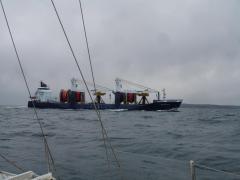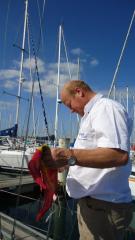How many times have you wondered if that big ship coming towards you in the Channel has actually seen you?
It was interesting at the weekend to have the opportunity to talk to Thierry Lacour, of the Yacht Club de Cherbourg, about how to be seen by big ships in the Channel. Thierry is a very experienced yachtsman as well as ship's captain; having sailed on America's Cup boats and Open 60s, he now owns 'Caminata', a Hustler 36 prototype, which he sails with his family.
Steps taken early to ensure a safe distance is maintained are vital, but there is always a moment when you've decided to pass ahead of a ship, and then the question naturally assumes great importance. By day it's not so bad, though a white hull and sails may not be easy to spot in a rough sea.
The problem in bad weather at night is that a yacht may not be easily visible on radar, so good lights are a necessity - Thierry said that, from the bridge of a ship, a masthead light is much harder to judge the distance of than deck-level navigation lights; a boat showing a masthead light may actually be much nearer than it looks. The old standby of illuminating the mainsail with a torch is still to be recommended if in any doubt.
Ships rely on AIS (Automatic Identification System) these days, and an AIS receiver is a very valuable (and relatively cheap) method of knowing how fast ships are travelling and on what heading, and exactly how far away they are. A major advantage of the system is that it provides the name and MMSI number of the ship in case you need to call on VHF, though a simple calculation provides a fairly accurate CPA (closest point of approach).
Thierry reckons that AIS transmitters, which are already extensively used in offshore yacht races like the Figaro Solitaire, will be obligatory for all vessels in the near future, and he thinks this will be an obvious step towards increased yacht safety. Having had AIS on my boat for some years, as well as radar (which it to some extent replaces) I can vouch for its usefulness, and will be looking at upgrading to a transmitter for next year.
Steve Fraser
Submitted on 19th September 2011


